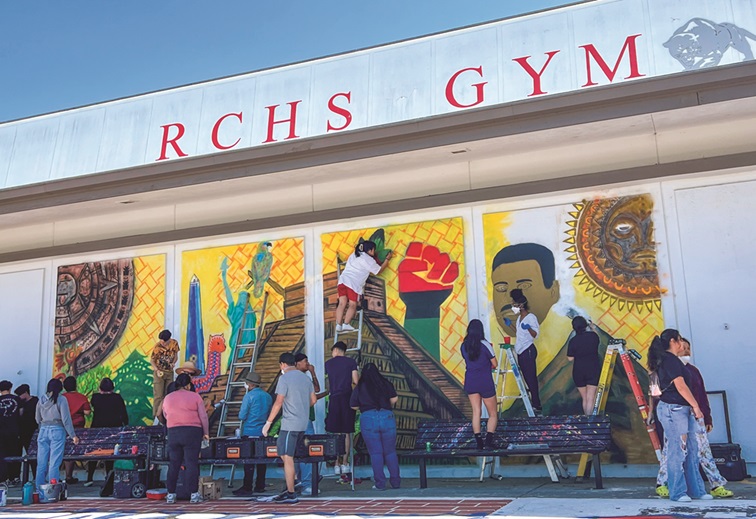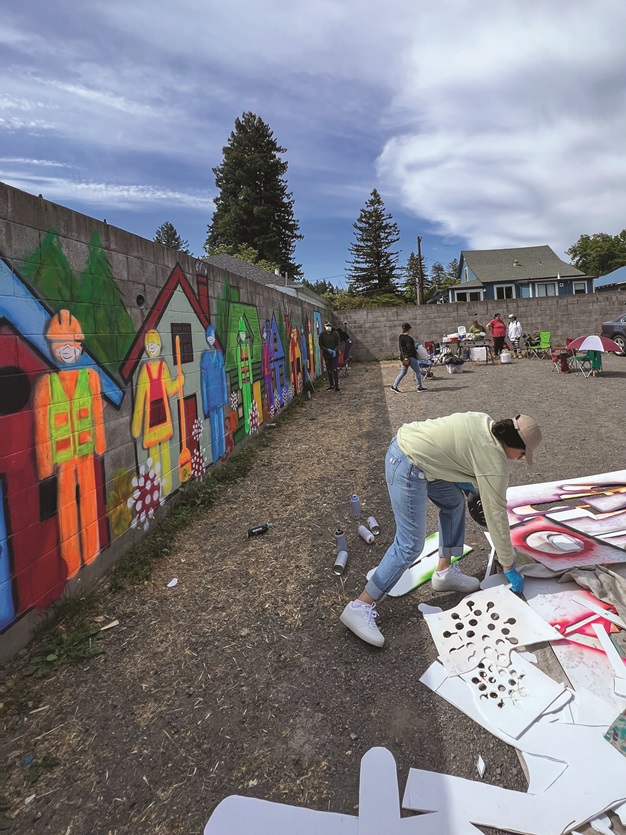Collective Vision
Raizes Collective Facilitates Healing Through Art and Culture
An Interview with Isabel Lopez, Executive Director of Raizes Collective
Art Collectives are a powerful way for artists to come together to bring their work forward. But Sonoma County’s Raizes Collective takes it much further. Raizes was founded to provide artists and educators of color with resources and assistance to produce art within their own communities. This support encompassed access to venues, programming, events, and various initiatives designed to cultivate art with the potential to instigate political and social transformations. Today, the collective has expanded their mission to empower and mobilize the wider communities of color through not only arts and culture, but leadership development, organizing campaigns, and community education.
“Raizes’ programs facilitate healing from the impacts of racial divisions, exploitation, and social and political powerlessness, and support the empowerment and engagement of Sonoma County’s underrepresented communities,” says Isabel Lopez, executive director.
Since 2015, they have worked with Latinx, immigrant and Indigenous youth, women, and farmworker families, as well as communities and artists of color, including offering critical outreach and information during natural disasters in culturally effective ways.
Lopez is enthusiastic about the collective’s programs, which include ALMAS Libres, a membership organization offering immigrant and Indigenous women access to information, know-your-rights training, leadership development and policy campaigns, and the Youth Empowerment program that brings together local artists, community, and youth to help youth use art and cultural traditions for healing and empowerment.
Raizes Collective also continues to support member artists by providing opportunities to exhibit and perform, sponsoring artistic and cultural projects, and facilitating cultural events and activities.
Made Local: Raizes Collective was founded almost 10 years ago. Could you share with us how the collective began?
Isabel Lopez: I saw the need for people who look like me, who I share lived experiences and values with, to have a space to organize and come together. Especially in Roseland, the Latinx heart of Santa Rosa where there is still no community or space where we can do that, a liberated space where we could create programs that heal us and, in turn, heal our community. Intergenerational spaces, joy-filled spaces, art-and-cultural-programs-filled spaces (for us, by us), respectful-of-human-rights places, where we could dream, build and create together. I have learned that systems are bureaucratic, and that community is powerful as a collective—we can do so much when we organize. Art and cultural work is a vehicle to create the world that we want to see and live in—La Cultural Cura or Culture Heals. My vision is to see ourselves (Raizes) in a stable permanent space, continuing to make those safe spaces for the community to create programs they wish to see in their community for future generations to come and thrive.
ML: What projects are you working on now, and how have they evolved over the years?
IL: Currently, we are working on mural projects at Piner High School, Marce Becerra Academy and Valley of the Moon Children’s Center with youth so we can have space to work through trauma—in my case, generational trauma. Traditional, one-on-one therapy doesn’t necessarily work for me. Focusing on painting a mural without having to speak to anyone, listening to some jams, and working alongside students and fellow artists and cultural workers is my therapy.
The new First Warrior Hikes program will provide a safe space for male-identifying students 7th-12th grade to consistently gather in Sonoma County’s outdoor recreational spaces. In addition to calisthenics, topics of discussion will center Lakota cultural teachings, identity, healthy masculinity, and substance-abuse prevention.
Raizes Collective is collaborating with Kimzin Creative, Petaluma River Park Foundation, and CMG (a landscape architecture firm) to co-create and lead arts engagement/activities to obtain data from the equity priority populations to help create a concept plan park design.
Another area Raizes prioritizes is leadership development, particularly in the undocumented community. The members of ALMAS Libres conduct their policy campaigns through training, coalition building, and mentorship. Currently they coordinate the Northern California Coalition for Just Immigration Reform, which builds undocumented leadership to pass a Path-to-Citizenship and are organizing, along with other coalition member organizations, for a fundraiser on May 11th to support the campaign for just immigration reform.
ML: How do you keep going, when so many have burnt out? What or who inspires your resilience?
IL: The women in my community who are able to hold so much and lead by example—they show me how to have boundaries, they show me how to step away from the bureaucracy when their work is no longer being respected—who challenge the status quo every day just by being who they are. Women who love in public and show solidarity with other women in challenging times. The women who surround me inspire me but also the women who came before me and my ancestors, who have kept certain traditions alive that I get to be part of now. The art-making, the Aztec dancing—all these things provide spiritual strength, so I don’t burn out.
ML: How does the kind of work that you do contribute to individual and global well-being?
IL: I (we) carry around generational traumas and environmental traumas, and these safe spaces, for me, are a way to express that and create a sense of healing. There’s so much cognitive dissonance that is unhealthy, and part of it comes from hearing from changemakers and leaders whose actions do not match their words, and, for me, it’s a way to shift that perspective. For me, this work is important to shift systems and create new ways of thinking, new decision-making processes and more horizontal organizational structures so that our staff and artists have more autonomy and decision-making power.
ML: How do you choose where to focus?
IL: It’s all been community driven, students, staff, community members, all reach out always and first. We are lucky to have autonomy to create and tailor our programs based on the needs of the classroom, libraries, universities, or other organizations that reach out to collaborate.
raizescollective.org | 707-486-6300



